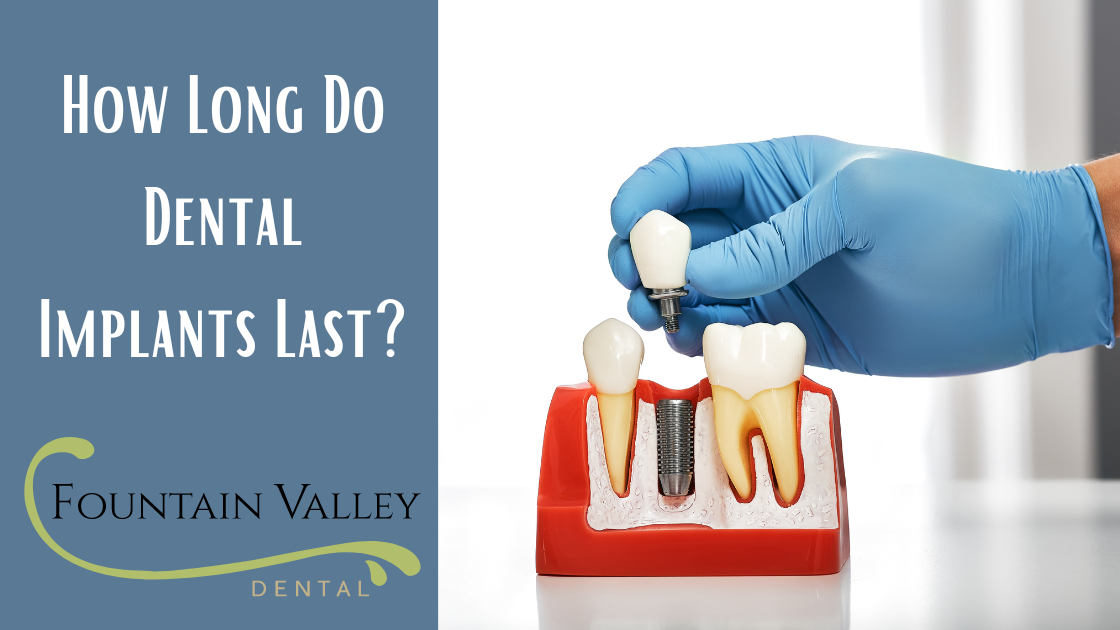Dental implants are the raining configuration for a missing tooth or teeth with a long-term solution. The replacement is a look-alike and requires similar maintenance to natural teeth. The length of a dental implant depends on patient choices and dental hygiene. The advancement in implant technology has made it difficult to have rejection or faulty issues with the implants. However, failure can be encouraged by misuse, existing medical conditions, and diseases.
What makes a dental implant?
Implants are made from solid materials which help them last a long time, such as;
- Implant – The titanium or zirconia post is screwed to the patient’s jawbone as the crown’s root.
- Abutment – The abutment comes with the implant to stable the crown.
- Crown – The crown is made of ceramic and fastened to the top of the abutment for looks and optimal function like the natural tooth.
However, the crown and abutment can get damaged faster than the implant due to exposure and active usage in biting and chewing.
The Average Lifespan of Dental Implants
Dental implants have three components that come into play when determining how long a dental implant lasts. First, a dental implant has a long-lasting lifespan because it is screwed with the surrounding bone and is not vulnerable to damage-related activities. Due to this reason, a dental implant can last for an average lifespan of 25 years or more, and there are rumors that the implant can last for a lifetime (permanent). However, as earlier stated, the abutment and prosthesis are vulnerable to damages, making them replaceable. Usually, the augmented implant may last for 10 to 15 years due to chewing and biting, leading to eventual surface wear and tear. However, the supported implant’s lifespan is determined by the usage level, materials used in making it, the location where it fills, and oral hygiene.
The type of prosthesis also determines an implant. For instance, a dental crown placed at the front teeth position will have a longer lifespan than an implant-supported denture. This is because the effectiveness of a bite or chew is stronger in the back teeth, which results in the wear and tear of the denture. However, you can replace the denture as it holds an entire arch of teeth. Remember that implant-supported bridges or dentures have a longer lifespan than traditional ones.
Factors affecting dental implants
Many factors affect the lifespan of a dental implant, such as;
- Lifestyle
Some activities affect the lifespan of these implants, such as smoking or tobacco products. These conditions have harmful effects on the dental implant lifespan. The lasting limit is shorter for smokers, resulting in a backup plan.
- Poor General Health
Poor hygiene is the primary cause of dental implant failure. In addition, a patient suffering from diseases like diabetes, lupus, inflammation, and other chronic diseases suffers risk of implant failure and instability over the long term.
- Gum Disease
Gum disease affects implants. Whether the disease exists or may occur at a future stage, it can lead to bone loss affecting implant mobility and failure.
- Wear of the Teeth
The stress placed on the teeth also affects the lifespan—the act of grinding and clenching causes the implant to detach from the jaw bone.
Contact Fountain Valley Dental – Dental Services in Molalla
MORE TIPS FOR DENTAL PATIENTS:
- What Are Porcelain Veneers?
- Do I Need Sedation for Dental Work?
- What is Oral Conscious Sedation?
- Can Everyone Use Invisalign?
- When to Fix a Tooth and When to Pull it
- How Professional Differs from OTC
- How Safe is Teeth Whitening?
- What is Sedation Dentistry?
- When Do I Need a Root Canal?
- Affiliate: Encompass Health in Cypress for Neurological Rehabilitation
